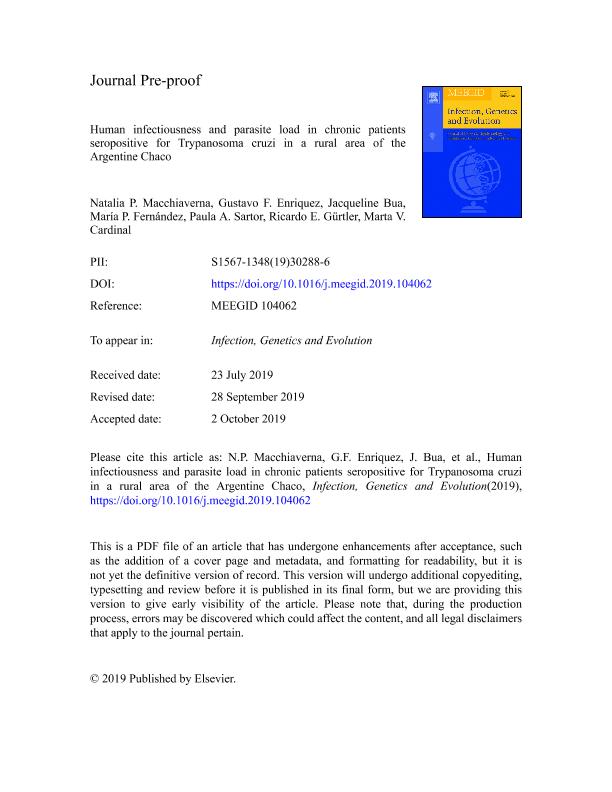Artículo
Human infectiousness and parasite load in chronic patients seropositive for Trypanosoma cruzi in a rural area of the Argentine Chaco
Macchiaverna, Natalia Paula ; Enriquez, Gustavo Fabián
; Enriquez, Gustavo Fabián ; Bua, Jacqueline Elena
; Bua, Jacqueline Elena ; Fernandez, Maria del Pilar
; Fernandez, Maria del Pilar ; Sartor, Paula Andrea
; Sartor, Paula Andrea ; Gurtler, Ricardo Esteban
; Gurtler, Ricardo Esteban ; Cardinal, Marta Victoria
; Cardinal, Marta Victoria
 ; Enriquez, Gustavo Fabián
; Enriquez, Gustavo Fabián ; Bua, Jacqueline Elena
; Bua, Jacqueline Elena ; Fernandez, Maria del Pilar
; Fernandez, Maria del Pilar ; Sartor, Paula Andrea
; Sartor, Paula Andrea ; Gurtler, Ricardo Esteban
; Gurtler, Ricardo Esteban ; Cardinal, Marta Victoria
; Cardinal, Marta Victoria
Fecha de publicación:
11/2019
Editorial:
Elsevier Science
Revista:
Infection, Genetics and Evolution
ISSN:
1567-1348
Idioma:
Inglés
Tipo de recurso:
Artículo publicado
Clasificación temática:
Resumen
A key parameter in the transmission of vector-borne infections, including Chagas disease, is the ability of the different host species to transmit the parasite to the vector (infectiousness). Here, we determined infectiousness to the vector of Trypanosoma cruzi-seropositive humans examined by artificial xenodiagnosis (XD), established its relationship with T. cruzi DNA levels (a surrogate of intensity of parasitemia) quantified by real-time PCR (qPCR), and assessed whether infectiousness was associated with the body mass index (BMI), age, ethnic background and parasite genotype. XD was performed to 117 T. cruzi-seropositive residents from Pampa del Indio and parasite load was quantified in 81 of them. Using optical microscopy (OM) 33.6% of the seropositive people tested were infectious and this fraction nearly doubled (66.0%) when XD triatomines were examined by kDNA-PCR. The mean infectiousness (defined as the percentage of all infected triatomines detected by OM at any time point among the total number of insects examined by OM 30 days post-feeding) was 5.2%, and the mean parasite load was 0.51 parasite equivalents per ml. Infectiousness to the vector was associated negatively with age and BMI, and positively with the detection of parasitemia by kDNA-PCR, and parasite load by qPCR in bivariate analysis. Patients with a positive XD by OM exhibited a significantly higher mean parasite load. Using multiple regression, infectiousness was associated with parasite load (positively) and with the household presence of T. infestans and Qom ethnic group (negatively); no significant association was observed with age or its interaction with ethnicity. We did not find significant associations between identified DTUs and infectiousness or parasite load. Infectiousness was aggregated: 18% of the people examined by XD generated 80% of the infected triatomines. Detecting and treating the super-infectious fraction of the infected human would disproportionally impact on domestic transmission risks. Nonetheless, treatment of all eligible infected people who meet the inclusion criteria regardless of their parasitemia should be ensured to improve their prognosis.
Palabras clave:
ETHNICITY
,
PARASITE LOAD
,
TRIATOMA INFESTANS
,
TRYPANOSOMA CRUZI
,
XENODIAGNOSIS
Archivos asociados
Licencia
Identificadores
Colecciones
Articulos(IEGEBA)
Articulos de INSTITUTO DE ECOLOGIA, GENETICA Y EVOLUCION DE BS. AS
Articulos de INSTITUTO DE ECOLOGIA, GENETICA Y EVOLUCION DE BS. AS
Articulos(SEDE CENTRAL)
Articulos de SEDE CENTRAL
Articulos de SEDE CENTRAL
Citación
Macchiaverna, Natalia Paula; Enriquez, Gustavo Fabián; Bua, Jacqueline Elena; Fernandez, Maria del Pilar; Sartor, Paula Andrea; et al.; Human infectiousness and parasite load in chronic patients seropositive for Trypanosoma cruzi in a rural area of the Argentine Chaco; Elsevier Science; Infection, Genetics and Evolution; 78; 11-2019; 1-37
Compartir
Altmétricas



